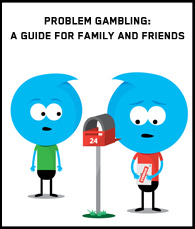How to help a person who gambles without enabling their addiction:

When the family and friends of people who gamble problematically google anything about enabling, they will often come across a rather harsh and guilt-inducing rhetoric. Woe betide any family member who dares to shield their gambling loved one from the natural consequences of their addictive behaviour; chastisements such as you are "loving them to death," "helping them dig their own grave" and "may as well be standing next to them as they gamble their life away," reign supreme.
The prevailing wisdom is that a gambling addict has to experience the full and damaging consequences of his or her addiction, indeed s/he needs to hit rock bottom before s/he will engage in the process of change and recovery. And the family and friends of the gambling addict must resolutely stand aside and exhibit 'tough love' as they watch their loved one drown in debt, go without food, face eviction, and suffer the consequences of their self-destructive behaviour.
In reality the family members of gambling addicts are caught between a rock and a hard place. How can a mum deny aid when her son is broke and has nothing to eat till next pay day. How can grandparents turn aside when their grandchild can't go on a school outing because their mum has gambled everything on the pokies? How can a wife not cover for her husband when he might lose his job and her children might lose their home? And then there is a darker side: when desperate, gamblers have been known to assault spouses, parents and other loved ones. Gamblers can lie and manipulate and use emotional blackmail such as threatening suicide if they don't get what they want, which is usually money.
So what is a friend or family member to do?
Like with many things in life, you need to strike a balance. Go with your gut. Decide when your loved one truly needs help, and when can you step aside and let them help themselves. Love them unconditionally, but don't mistakenly believe you can fix everything or shield them totally from the ravages of addiction.
It is true that giving money to a compulsive gambler is like trying to extinguish a fire by dousing it with petrol. It just makes things worse. This is not to say that the person who gambles does not need financial help; however, assistance from family members should never be in the form of cash.
If the person who gambles needs:
- food: you can buy a Coles or Woolworths gift card up to the value of $500 online or instore
- petrol: go to the petrol station with your loved one and fill the tank, or you can purchase a Woolworths gift card that covers petrol at Caltex stations, and the Coles gift card covers petrol at Shell stations
- rent and bills: rather than giving cash for rent or bills get the banking details of the creditor and pay directly into the account
Help them to manage their money - the person who gambles should deposit his/her pay into an account controlled by a spouse or trusted family member. An agreed upon budget should be calculated and a small amount of spending money given to the gambler until sound recovery is established and trust is rebuilt. Consult a financial counsellor who is knowledgeable about gambling addictions prior to refinancing or consolidating debt.
Set boundaries - know your limits by considering what you are willing to accept and what you will no longer tolerate. Say no if you can't afford it. If you feel manipulated or bullied assertively maintain your boundaries but always keep yourself safe.
Be Honest - it may seem easier to turn a blind eye and say nothing to avoid conflict, but it is important to be upfront with the person who gambles. Let them know how their gambling and money problems affects you and how you see it affecting them. The more often they have to face reality, the more likely they are to come to terms with the fact that they have a problem with gambling.
Urge them to get help – every time you help the person who gambles you should also encourage him or her to seek professional help in order to make a healthy and lasting recovery.
Get support for yourself: If you feel that you can only be happy when the person who gambles is happy; if you are lying awake at night worrying about them; if you are driven to rage at their behaviour; or if you are bankrupting yourself to help them out, then you are sacrificing your own mental health and taking responsibility for someone else's problems. If this is the case, see a counsellor for support.
Enabling addiction is not the best thing to do, but neither is abandoning your loved one and hoping they hit a bottom rocky enough to motivate them to get well. Showing support and unconditional love is most beneficial thing you can do for a person who gambles. Because contrary to the 'rock bottom' myth, most people who seek and achieve recovery do so because they want to be better people and because they want to earn the trust, respect and love of their family and friends.
